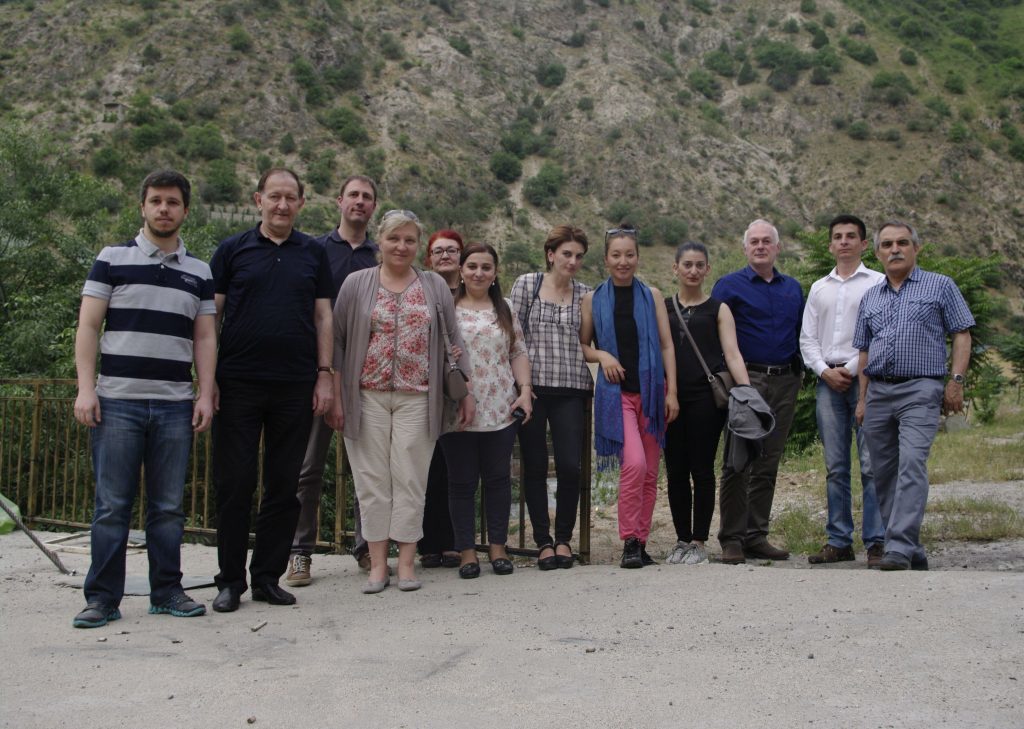
The annual TEW-CCA workshop took place from 30th of May to 4th of June in Dushanbe (Tajikistan) this year. The workshop was organized by the partner research institute SHARQ ORIENS in cooperation with the University of Bamberg. The agenda of the second TEW-CCA workshop included tasks defined in WP3 of the project, particularly review of both, source and target questionnaires, examination of a pretest outcome, questionnaire adjustment as well as overall survey strategy.
Specifically, the first two days of the workshop were dedicated to the review of the source questionnaire and target questionnaires developed by the national teams of Azerbaijan, Georgia and Tajikistan. Within this review process all national teams presented the educational system of their countries. The focus of presentations laid on the general structure of the education system and the screening process into different educational tracks. Subsequently, the educational track system of each country was the basis for determining a filtering system of the source and target questionnaires.
Each survey country conducted a pretest earlier this year. Accordingly, national teams briefed project members about the pretest results in the second half of the workshop. 60 standardized face-to-face interviews (PAPI) were conducted in total. The overall pretest goals were defined by the national and German management teams prior to pretest: testing of interviewer training materials; testing of a survey instrument and the evaluation of interviewer skills in order to determine intensity of interviewer training.
Non-probability convenience sampling based selection of respondents considered three selection criteria. Thus are rural vs. urban areas, level of education of the respondents and timing of leaving education during the pretest. There was no need of incentives for respondent recruitment.
Regarding the interviewer training material, the pretest showed that the training material on survey instrument provided by German team covers all questions related to instrument structure, design and its implementation. The national team coordinators who implemented study specific training did not report any kind of lack in the training material. According to Georgian report on pretest, examples given in the training material are perfect help to explain retrospective design of the questionnaire. Still some of interviewers were challenged with the instrument structure, especially in filling out calendars. On this issue, TEW-CCA team agreed to address this question prior to survey interviewer training which will be held in autumn 2016.
The test of survey instrument revealed mainly shortcomings of three kinds; filtering, ambiguous questions and lack of appropriate answer options. These outcomes became basis for the post pretest questionnaire adjustment, another focus of the workshop. Questionnaire adjustment was performed in two phases. The first phase focused on questions that are relevant to all three countries whereas a closer look was taken on country specific questions within the second phase. Within this adjustment process the ambiguous questions were excluded from the questionnaires. The additional answer’ options collected during the pretest were discussed carefully and appropriate once were included into answer categories. The filtering system of all questionnaires was updated according to the pretest outcomes. Furthermore in accordance with the national coordinators, the project manager M. Gebel recommended one week of interviewer training that combines training on general interviewing techniques and study specific training.
The workshop in Dushanbe offered also a place to discuss the strategy of each country for the survey fieldwork. The main goal of these discussion rounds was to achieve more harmony between the countries sampling methods and the methods of interviewer training as well as fieldwork management. Hence each country presented their survey strategy that was followed by vibrant discussions. All three survey country teams agreed to consider the sampling method “multi-stage area cluster sampling”, which is a common design used in developing countries. A random selection of respondents at the last stage will be assured through the “last birthday method”.
Besides many stimulating discussions and achievements on the project, TEW-CCA team Tajikistan has organized a public lecture together with the University of Central Asia on “integration of youth into labour market” in Dushanbe. The German team attended this event and introduced the TEW-CCA project. The lecture and the following vibrant discussion were attended by students from Central Asia, academic staff as well as representatives from international organizations (e.g. GIZ Germany).
